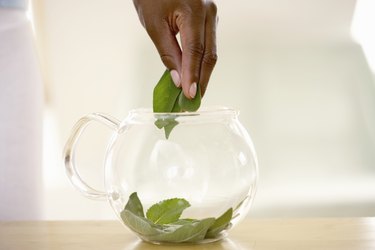
Herbal teas are natural remedies that are made by steeping parts of the root, plant or flower of the herb in boiling water. Many herbs are relatively benign when taken in moderate consumption, and can be safely combined with other herbs that have similar effects, such as chamomile and peppermint teas. For best results, gauge your teas so that you follow the recommended dosage of each individual herb, and talk to your doctor if you are taking medications, including over-the-counter, or OTC, drugs.
Combining and Mixing Herbs
Video of the Day
Practitioners of alternative medicine sometimes recommend tea blends that contain a certain combination of herbs. Although some ingredients may be chosen for flavor or aroma, most herbs are selected because of their complementary effects on the body. The chamomile-peppermint tea recipe provided by the Herbal Gardens website involves combining ¼ cup of dried peppermint to ½ of dried chamomile flowers, combining the calming effect of both herbs in a single blend. Practitioners of Traditional Chinese Medicine may sometimes recommend prescription teas that contain a wide range of herbal ingredients.
Video of the Day
Dosages
One of the primary concerns about drinking different herbal teas in the same day is the individual dosage of each herb. If you are drinking an herbal tea blend that contains equal parts of echinacea and ginger root, you may consume the recommended daily limit of 2 g of echinacea root before the recommended 4 g of ginger. Always research the dosage of each individual herb when making your own teas, or follow the recommended dosage printed on the product label.
Complications
Take OTC or prescription drugs before you drink different herbal teas in the same day. Certain herbs may interfere or contradict the effect of different medicines, potentially worsening your symptoms or causing unstable reactions. MayoClinic.com advises against consuming the following herbs while taking heart disease medications: St. John's wort, ginkgo, ginseng, garlic, saw palmetto, danshen, licorice, hawthorn, yohimbe and dong quai.
Safety Concerns
When in doubt, avoid drinking multiple types of herbal tea to reduce your risk of negative symptoms. Talk to a licensed alternative doctor before taking any herbal blend, and always check with your personal physician if you're on medication.
- East West School of Planetary Herbology; Herb-Drug Contraindications; Michael Tierra
- Herbal Gardens: Chamomile-Peppermint Tea
- The University of Maryland Medical Center; Ginger; Steven Ehrlich; Nov. 17 2008
- MayoClinic.com; Herbal Supplements: Can They Interact With Heart Medications?; Martha Grogan; June 4, 2010